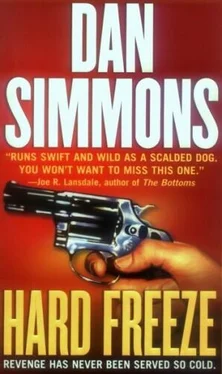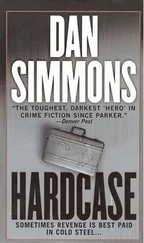But there were no children in his collection of the twenty-eight Culled, Hansen knew, only demonettes who were not the Children of God, but the Spawn of the Enemy. This realization when Hansen was in his twenties—that God had given him this special ability, this second sight to differentiate the human girls from the young demons in human form—was what allowed him to carry out his ordained task.
This last girl's eyes stared up toward the camera after strangulation with that same look of total surprise and terror—surprise at being found out and terror at knowing she had been chosen to be Culled, Hansen knew—as had the other twenty-seven.
He always allowed himself precisely one hour to review the photographs. Showing the self-discipline that separated him from the mindless psychopaths that stalked the world, Hansen never took any souvenirs other than the Polaroid photos. Nor did he masturbate or otherwise attempt to relive the excitement of the actual Culling. This hour of reflection and review every Sunday was to remind him of the seriousness of his mission on earth, nothing more.
At the end of the hour, Hansen locked away the titanium case, looked lovingly at his collection of firearms reflecting the halogen spotlights, and left his gun room, scrambling the combination and activating the special alarm system as he did so. It would be another two or three hours before Donna and Jason returned from her parents' place; Hansen planned to use the time reading his Bible.
Donald Rafferty returned to his Lockport home on Sunday evening, obviously tired from his weekend trip with DeeDee, his Number Two girlfriend. Kurtz was parked down the street and monitoring the bugs in the Rafferty house.
"Did that kid—whatshername, Melissa? — come over this weekend while I was gone?" Rafferty's voice sounded slurred and tired.
"No, Dad."
"You lying to me?"
"No." Kurtz could hear the alarm in Rachel's voice.
"What about boys?"
"Boys?"
"Which boys were here while I was gone, goddammit?"
Kurtz knew from his phone taps that Rachel really didn't talk to any boys, other than Clarence Kleigman, who was in orchestra with her. She would never invite a boy to the house.
"Which boys did you have over here? Tell me the goddamn truth or I'll get the yardstick out."
"No boys, Dad." Rachel's voice was quavering slightly. "Did you have a good business trip?"
"Don't change the fucking subject." Rafferty was still quite drunk.
A minute of ambient noise and hiss. From the crashing around in the kitchen, it sounded like Rafferty was hunting for one of his bottles.
"I have homework to finish," Rachel said. Kurtz knew that she had finished all of her homework by Saturday night. "I'll be upstairs." From the bug in the hall, Kurtz could hear the sound of Rachel slipping the lock shut on her door as Rafferty stamped upstairs and began throwing his clothes around the bathroom.
It was snowing hard. Kurtz let the snow blanket the windshield as he sat listening to random noises through his earphones.
It had not been a promising week. Kurtz followed few rules in life, but not leaving enemies behind him came close to a rule for him, and this week he had left two people around who wished to do him harm—Big Bore Redhawk and the dying man, Johnny Norse. In each case it had simply been more trouble to deal with them than to let them live; Big Bore had more reasons to stay silent in the hospital than to rat Kurtz out, and Johnny Norse had no idea who Kurtz and Angelina were or what Kurtz's relationship to Emilio Gonzaga might be. Kurtz remembered Norse's almost obscene eagerness to hang onto the last dregs of life and felt secure that the dying man would not be contacting Gonzaga about the visit. But Kurtz's motto had always been "Why play the odds when you can fix the race?" In these cases, though, it would be riskier to deal with bodies than with odds.
Still, it was a bad habit to leave loose ends behind him and Kurtz could not afford bad habits at the moment.
Joe Kurtz knew that his one strength over the past dozen years—besides patience—was his ability to survive. Beyond the minimal survival skills necessary for spending more than a decade in a maximum security prison without getting raped or shanked or both, Kurtz had avoided the fatwa of the D-Block Mosque gangs when they had come to believe that he had killed a black enforcer named Ali a year before Kurtz's parole. Once back in Buffalo last autumn, Kurtz had gained the enmity of another black gang—the Seneca Street Social Club—who actually believed that he had thrown their leader, a drug-dealing psychopath named Malcolm Kibunte, over Niagara Falls.
The cops who were tailing him—Brubaker and Myers—believed that Joe Kurtz had shot a crooked homicide detective named Hathaway, even though there was absolutely no evidence for that Kurtz knew that Brubaker's suspicion had been fueled from Attica by Little Skag Farino, whose gratitude for Kurtz having literally saved his ass from Ali was now being shown by the third-rate hit men that Skag was hiring to kill him.
Kurtz doubted that Brubaker and Myers would try to kill him, but sooner or later they would roust him while he was carrying, which meant jail again, which meant all the current death sentences on Kurtz converging.
Then there were the Farino and Gonzaga families. You don't strike—much less kill—a made guy without paying for it; it was one of the last enforceable tenets of the weakening Mafia structure. And while Kurtz had not been involved—directly—in the shootings of Don Farino, his daughter, his lawyer, or his bodyguards the previous autumn, that fact would do him little good. Little Skag knew that Kurtz had not killed his family members, since Little Skag had ordered the hits on them himself, but he was also aware that Kurtz had been there during the denouement at the Farino compound. Joe Kurtz knew too much to stay alive.
Now Angelina Farino Ferrara was trying to use Kurtz to kill Gonzaga. Kurtz hated being used more than almost anything in the world, but in this situation, the woman had leverage over him. He had done his eleven and a half years in Attica for the killing of Sam's murderers with some patience because it had been worth it—Samantha Fielding had been his partner in every way—but now those years were shown to be worthless. If it had been Emilio Gonzaga who put the hit on Sam, then Gonzaga had to die. And die soon, since Gonzaga would be taking over the Farino Family by the end of summer, which would make him all but invulnerable.
If Angelina really wanted Kurtz dead now, all she had to do was tell Gonzaga. There would be fifty button men on the street in an hour.
But she had her own agenda and timeline. That's why Kurtz was allowing himself to be used by her. Gonzaga's death would suit both their purposes—but then what? A woman could not become don. Little Skag would still be the heir apparent of what was left of the once-formidable Farino family, although without the Gonzaga judge and parole-board connections, Little Skag might be cooling his heels in maximum security for more years to come.
Was that Angelina's plan? Just to keep Little Skag in prison while she eliminated her rapist, Emilio Gonzaga, and tried to consolidate some power? If so, it was a dangerous plan, not just because Gonzaga's wrath would be terrible if an assassination failed, but because the other families would intervene eventually—almost certainly at Angelina's expense—and Little Skag had already shown a willingness, actually an eagerness, to whack a sister.
But if she could blame Gonzaga's murder on this loose cannon, this non-made-guy, this madman Joe Kurtz—This scenario seemed especially workable if Joe Kurtz was dead before Little Skag's killers or the Gonzaga Family or the New York families' people caught up to him.
Читать дальше












